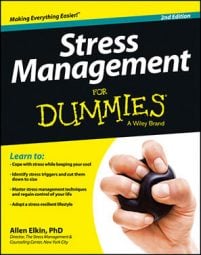Much of your stress might be caused by your own thought processes. Below are three habits that can induce stress: conclusion-jumping, needing to be in control, and self-rating.
Conclusion-jumping leads to stress
Jumping to a catastrophic conclusion can induce extra worry and stress. You might often come to a conclusion without having all (or at times any) of the evidence. Consider these worry-making interpretations:
“Everyone seems to be avoiding me, probably because I’m going to be laid off!”
“She hasn’t returned my call yet, so she must not like me!”
“This headache means I have a brain tumor!”
“Because I did poorly on this last test, I’ll never get into a good school!”
“I’ll never find anybody who wants to be with me!”
When you jump to conclusions, you could be inducing unneeded stress. Try to examine your conclusions consciously. Could you be right? Sure. Are you right? Probably not. Ask yourself:
“Do I really have any solid evidence that my worry is true?”
“Could I convince a jury of my peers that my worry makes sense?”
“If a good friend said this same thing to me, would I support her negative conclusions?”
“Have I jumped to conclusions in the past and later found out I was badly mistaken?”
Uncertainty and lack of control lead to stress
Alas, our world is filled with uncertainty. And when you’re uncertain, you feel out of control. A sense of not having control can easily trigger stress. You would like to have control over the unpleasant and unsettling events in your life, but frequently you can’t.
You might cause yourself to feel far more stressed than you have to. Becoming more comfortable with uncertainty and lack of control is an essential part of your program of stress management.
The first step in becoming more comfortable with not having control is recognizing the extent of your control.
Take a moment to complete this little exercise. Use this simple point scale:
0 = No control
1 = A little control
2 = Lots of control
To what extent can you control the following events or circumstances? For each situation, rate the amount of control you actually have on the event (from 1 to 5, for example).
Traffic __________
Other people’s personalities __________
The weather __________
The speed of elevators __________
Crime __________
Street noise __________
Stopping people from acting like idiots __________
You get the point. You can be incredibly limited when it comes to controlling your world and those who live in it. So, the next time you find yourself in a potentially stressful situation, ask yourself, “How much control do I really have in this situation?”
If your answer is “not much,” ask yourself a second question: “Then why am I making myself so stressed?” Sometimes, just acknowledging that you have no control can reduce your level of worry. Because you can’t change it, maybe you can accept it. Worrying won’t help.
Watch out for self-rating creating stress
One of the more important sources of distress and worry in people’s lives is self-rating. You self-rate whenever you equate the way you value yourself (your self-worth) with your performance, your societal status, your achievements, your looks, your smarts, or any other trait or ability.
You also self-rate when you tie the approval of others into your own feeling of self-worth. Worrying enters the picture when you’re uncertain about whether you have what you feel are the necessary ego-maintaining qualities, or when you feel that you might lose the approval of those around you. To recognize whether your worrying is the result of self-rating, ask yourself the following questions:
Am I overly worried about what others will think of me?
Am I overly concerned about not doing well?
Do I feel that my worth depends upon my job title?
Do I feel that too much of my self-worth is tied to how others see me?

